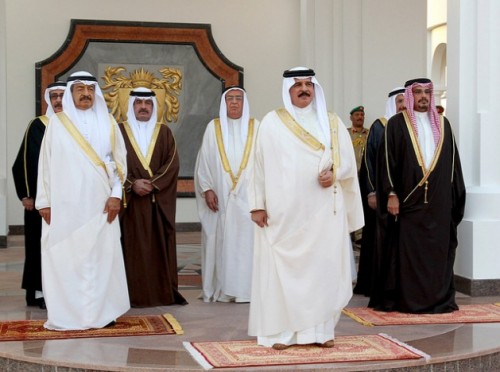Ali Al-Aswad: Devastating Consequences of Ruling Family Rivalry over Power in Bahrain

Ali AlAswad - 2019-10-02 - 10:14 p
In so far as Bahrain is experiencing a public power-sharing dispute between the opposition and the ruling family, there is a rivalry, which may become a conflict among the ruling family, over the share of economic, political and security powers in the country, which adversely affects the overall internal situation.
The rivalry began since the first day Emir Hamad bin Isa Al Khalifa (current king) came to power after his father's demise (on March 6, 1999). The Emir assumed power, but his rule was met with the Prime Minister's incursion into all junctures of the state.
A year and a half after taking office, the Emir ordered the formation of a committee to draft a National Action Charter, as part of what he called a reform project in agreement with opposition parties. This label provoked the Prime Minister, who protested by saying: "Reform comes after sabotage, were we saboteurs?!"
Some may have much to argue about the intentions of the former Emir or current king, but the constitutional reform promised in the National Action Charter suggests that the reform process was not intended to re-establish "parliamentary life", but to fundamentally re-monopolize the emirate's powers.
At the Emir's request, constitutional expert Ramzi Al-Shaer restructured a new form of power. Power became shaped as an inverted pyramid. The king (at the top) has the complete powers while others are overcrowded at the (bottom).
Once again, as much as the king withdrew powers from the legislative authorities (the people), he withdrew powers from his uncle, the influential Prime Minister. The new constitution, which he single handedly launched in 2002, revealed that the goal behind two years of public deliberations was to consolidate power in his hands.
If you return to the Constitution, you will find a large amount of articles that begin with "the king appoints, the king exempts and the king constitutes". You find out that, in this large number of articles, this king did not only become independent in appointing members of the Government, but also presided over the executive authority.
Under the judiciary chapter, the King presides over the judiciary, appoints and dismisses judges at various levels of litigation. He took control of the legislative authority and gave himself the right to appoint half of its members (the Shura Council) and the right to issue decrees that have the status of laws.
In this frantic competition, political reform no longer has a real place in the national agenda. Competition among the ruling family over strengthening their positions has become their focus at the expense of big issues. That rivalry didn't come to an end after the imposition of the new Constitution, but rather escalated dramatically.
It's true that the Prime Minister's attempts did not succeed in impeding the king's total monopoly over power, but they showed how the conflict within the ruling family is contributing to the obstruction of the work of government agencies, and in this context we can refer to what was then known as the "labor market reform plan".
The Prime Minister disrupted plans of the Economic Development Council, chaired by Crown Prince Salman bin Hamad Al Khalifa. This caused a public rift before the king intervened to resolve the conflict in favor of his son. It was not the only mess, as there was competition for control over Mumtalakat Company as well.
The sovereign fund and the companies under it have become another stage for family competition, and this is now taking place at the National Bank of Bahrain, as the Crown Prince is believed to have taken control the National Bank, which for years has been under the Prime Minister's authority.
With his appointment as first deputy Prime Minister and having direct supervision over the Financial Balance Program (a Gulf-backed financial reform plan), the Crown Prince started to acquire broad administrative powers, including the appointment of government directors, as well as economic powers that were a space for Khalifa bin Salman's movements.
In addition to the negative effects of the absence of a unified executive authority, one can noted the financial damage caused by the race for the acquisition of land plots and submerged lands, which has caused the drainage of billions of dollars.
The family power struggle in Bahrain has been a major factor in the destruction of the idea of reform, and the political and security turmoil that has continued since the king assumed power. We can't deny the effects in terms of waste of national wealth.
Addressing these complex situations cannot be done through fragmented financial reform programs, even if ambitious. It should be done through a major project that puts an end to family sharing of power and establishes genuine popular participation in governing the country's affairs.
This cannot be done without harsh measures that would end the influence of parties in the ruling family. Perhaps this should begin with the advice given by Judge Mahmoud Sharif Bassiouni to the King to dismiss his uncle, the Prime Minister, in order to preserve the unity of the people.
Eight years following this piece of advice, this is no longer enough if not followed by ending the influence of other influential persons such as the Royal Court Minister Khalid bin Ahmed Al Khalifa and his right hand. Dismissing these parties can clear the path for administrative reform by forming a national government with full powers in the first phase of a national rescue plan that would include a political dialogue that would produce lasting solutions.
- 2025-07-17Bahrain: Ashura Violations and the Need for Constitutional Guarantees
- 2025-07-16þBahrain: The Day After the Release of Political Prisoners?
- 2024-07-10Bahrain Between External Peace and Internal Reconciliation: Unresolved Issues Require Fundamental Solutions
- 2023-10-02Latifa Al-Husseini: How Many More Blows Must Bahrain's Regime Cause Itself?
- 2023-08-07Latifa Al-Husseini: Ashura in Bahrain